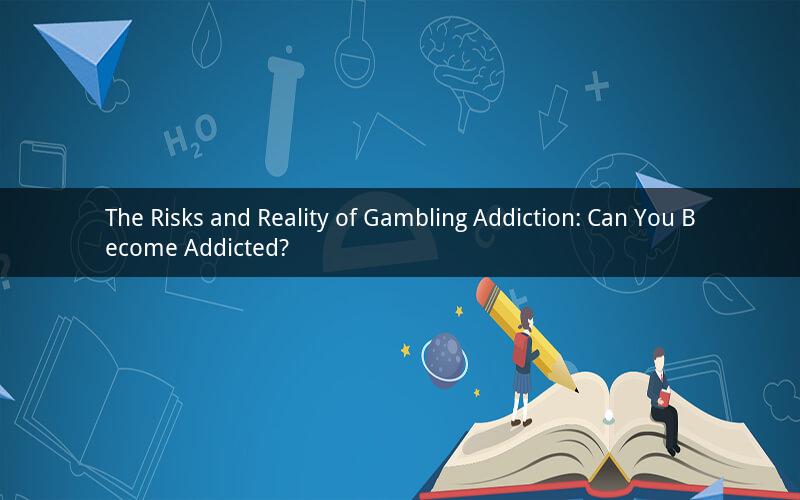
Introduction:
Gambling addiction, also known as problem gambling, is a significant concern in today's society. With the rise of online gambling platforms and the availability of various forms of betting, it is crucial to understand the risks and reality of becoming addicted to gambling. In this article, we will explore the factors that contribute to gambling addiction, the signs and symptoms, and the potential consequences. Additionally, we will address the question of whether one can become addicted to gambling.
1. Understanding Gambling Addiction
Gambling addiction is characterized by an uncontrollable urge to gamble, despite negative consequences. It is a mental health disorder that can affect individuals of all ages, genders, and socioeconomic backgrounds. Unlike physical addiction, gambling addiction does not involve a substance, but the compulsion to gamble can be just as powerful and harmful.
1.1 Causes of Gambling Addiction
Several factors can contribute to the development of gambling addiction. These include:
a. Genetic predisposition: Research suggests that certain genetic factors may increase the risk of developing gambling addiction.
b. Environmental factors: Exposure to gambling opportunities, such as casinos, racetracks, and online platforms, can increase the likelihood of developing an addiction.
c. Psychological factors: Individuals with certain personality traits, such as impulsive behavior and thrill-seeking, may be more susceptible to gambling addiction.
d. Social factors: Peer pressure, family history, and cultural influences can also play a role in the development of gambling addiction.
1.2 Types of Gamblers
There are different types of gamblers, each with unique characteristics:
a. Social gamblers: These individuals enjoy gambling for leisure purposes and do not experience any negative consequences.
b. Problem gamblers: These individuals may experience some negative consequences but are still able to maintain control over their gambling behavior.
c. Pathological gamblers: These individuals experience severe negative consequences due to their gambling addiction and struggle to control their behavior.
2. Signs and Symptoms of Gambling Addiction
Identifying the signs and symptoms of gambling addiction is essential for early intervention and treatment. Some common indicators include:
a. Preoccupation with gambling: The individual constantly thinks about gambling, planning their next betting session, or reliving past experiences.
b. Increased frequency of gambling: The individual may start to gamble more frequently or for longer periods of time.
c. Neglecting responsibilities: Work, school, and personal relationships may suffer as a result of gambling addiction.
d. Financial problems: Borrowing money, selling possessions, or experiencing financial distress due to gambling may occur.
e. Emotional and psychological consequences: Depression, anxiety, and other mental health issues may arise due to the stress and shame associated with gambling addiction.
3. Consequences of Gambling Addiction
The consequences of gambling addiction can be severe and affect various aspects of an individual's life:
a. Financial problems: Gambling addiction can lead to significant debt, bankruptcy, and financial ruin.
b. Relationship issues: Marriages and other personal relationships may suffer due to the emotional and financial strain caused by gambling addiction.
c. Legal problems: Individuals with gambling addiction may engage in illegal activities to fund their gambling habits, leading to legal consequences.
d. Mental health issues: Chronic stress, anxiety, and depression can result from the ongoing struggles associated with gambling addiction.
4. Can You Become Addicted to Gambling?
Yes, it is possible to become addicted to gambling. The question of whether one can become addicted depends on various factors, including genetic predisposition, environmental influences, and personal characteristics. While not everyone who gambles will develop an addiction, some individuals may be more susceptible to the harmful effects of gambling.
5. Prevention and Treatment
Preventing gambling addiction involves awareness and education about the risks and consequences. Some strategies for prevention include:
a. Limiting exposure to gambling opportunities: Avoiding casinos, racetracks, and online gambling platforms can reduce the likelihood of developing an addiction.
b. Strengthening self-control: Developing self-discipline and setting limits on gambling activities can help prevent addiction.
c. Seeking support: Support from friends, family, or professional help can be beneficial in maintaining control over gambling behavior.
Treatment for gambling addiction can include various approaches, such as:
a. Therapy: Cognitive-behavioral therapy (CBT) and other therapeutic techniques can help individuals develop healthier coping mechanisms and address underlying issues.
b. Support groups: Joining a support group, such as Gamblers Anonymous, can provide individuals with a sense of community and shared experiences.
c. Financial counseling: Working with a financial counselor can help individuals manage their debt and regain control over their finances.
Conclusion:
Gambling addiction is a serious concern that can have far-reaching consequences. Understanding the risks, recognizing the signs and symptoms, and seeking appropriate prevention and treatment options are crucial in addressing this issue. While it is possible to become addicted to gambling, awareness and proactive measures can help individuals maintain a healthy relationship with gambling and avoid the harmful effects of addiction.
Questions and Answers:
1. Q: Can anyone become addicted to gambling?
A: Yes, anyone can become addicted to gambling, regardless of age, gender, or socioeconomic background.
2. Q: How can I tell if I have a gambling addiction?
A: Look for signs such as preoccupation with gambling, increased frequency of gambling, neglecting responsibilities, financial problems, and emotional distress.
3. Q: Is it possible to recover from a gambling addiction?
A: Yes, recovery from gambling addiction is possible with appropriate treatment and support.
4. Q: What are the consequences of gambling addiction?
A: The consequences can include financial problems, relationship issues, legal problems, and mental health issues.
5. Q: How can I prevent gambling addiction?
A: Limit exposure to gambling opportunities, strengthen self-control, and seek support from friends, family, or professionals.